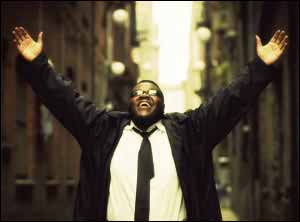|
PROFILE Rapper Damian loves beauty of Shabbat table | |
RAPPER Damian Black - who goes by the name Nissim - grew up in a rough suburb of Seattle.
His father was Captain Church, of the city's first rap group Emerald Street Boys, and his mother was also a rapper. From an early age, Nissim was exposed to violence, drug abuse and drug dealing. At the age of eight he was converted to Islam by his grandfather, a Sunni Muslim with a criminal background who recently died in prison. Nissim was converted to Christianity at the age of 13 by the Seattle Union Gospel Mission, whose youth centre hip-hop programme Nissim attended. Going to the missionary camp was a "great" experience, Nissim said, because it got him out of his rough environment. But it never answered his searching questions. He recalled: "I needed answers. When I was a kid in Bible study they never had answers. If Jesus was Jewish, why are Christians not Jewish? Which religion came first, Christianity, Islam or Judaism?" But for some seven years Nissim's religious questions were put on the backburner as he advanced his music career. Vitamin D, the founder of Seattle hip-hop, began recording Nissim as D Black when he was only 13. Nissim collaborated on God Like on fellow Jewish rapper Jake One's White Van Music album. But with fame came jealousy from the rap community. One rapper began insulting Nissim and rap-battling against him. But the situation got out of hand when one of Nissim's friends decided to protect his friend's honour. But his friend was arrested and imprisoned for a shooting in a nightclub. The rap battle was not his only problem. The previous year his mother had died of an overdose of prescription drugs. "At that point after the rap-battling, I dropped everything and I started praying," he said. "A serious amount of prayer led me to questioning. "My questions about Christianity had never been answered. Prayer led to seeking and searching." An online search for truth and inspiration led Nissim to the websites of Chabad and Breslov. He said: "I was able to find a lot of light." Then he began to read Jewish books, particularly those written by the Israeli Breslov chassid, Rabbi Shalom Arush. He said: "The books changed my life, mainly Garden of Peace. The Marital Guide for Men put me on fire. It was amazing." Eventually after years of study and initial rejections, Nissim, his childhood sweetheart wife Adina, their two children and his wife's sister, who was dating Nissim's best friend, were all converted by an Orthodox Beth Din in Seattle. The conversion was followed by a double Jewish wedding for the two couples, paid for by the Seattle Jewish community. Being Jewish, said Nissim, whose name means miracles, "brought me a lot of joy and wholeness. My children love Shabbat. "When I grew up, I never sat at a table with my family. Not only on Shabbat, but throughout the week, I sit at the table with my kids and talk to them. I'm able to give them a whole lot of life that I never had. "My daughter goes to a Torah day school. The more I have grown religiously, the more Hashem has opened my eyes so I can see more." Now Nissim and his former fervent southern Pentecostal wife have three children. During his conversion, Nissim had all but turned his back on his music career. But he was encouraged to return to the scene to use it as a vehicle to reach young, alienated Jews. "I went back to music with a lot of encouragement and nudging from shamayim (heaven)," he said. "I get to travel the world and speak. I guess I'm filling a void for people who like to hear something a bit more contemporary but are Jewish conscious. Young people really respond to it. It's been a beautiful thing." Nissim no longer performs on Shabbat. Instead of rapping about drugs and violence, as he did in his D Black incarnation, Nissim now incorporates Jewish rituals like negel vasser (hand washing), tefillin, mezzuzot and pictures of the Lubavitcher Rebbe into his videos. But his rapping, which has received sudden success, is not just targeted at Jews. Nissim said: "They are all geared to a much wider audience, but anyone who is Jewish will have an idea of a lot of the things I am saying. "I am heavily accepted in the Jewish community, particularly by the youth. It has allowed me to do a little kiruv (Jewish outreach) and plant some seeds. "I try to get people excited about their Judaism. It is very sad. We are fighting the bigger Holocaust of assimilation." He was recently in London telling his story to the Jewish community. He said: "I was asked in London by a kid, 'You've been to Islam and Christianity. Why go to Judaism?' "I told him, 'Islam was presented to me. Then when I was 13 somebody did the same thing with Christianity. But with Judaism I had to chase after it, despite the rejection of the rabbis for years and years. "When someone wins the lottery, the money goes very quickly. But when a person works for money they hang onto it, they become a miser, they don't want to give it away. "It's no different for me, a person who came from the outside, to someone who was born Jewish all their life. They have to work to keep their Judaism. I had to work." And work at his Judaism Nissim certainly does, attending his local Breslov shul daily, studying Torah. Nissim was particularly excited about his visit to the grave of the Rebbe Nachman of Breslov in Uman over Rosh Hashana. Nissim said he receives fan mail from Manchester and would love to perform and speak there if invited.
|
